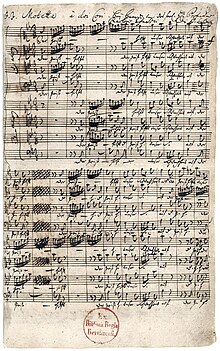The Spirit helps up our weaknesses
The Spirit Helps Our Weakness Up ( BWV 226) is a motet for two choirs by Johann Sebastian Bach .
Emergence
In contrast to many other Bach works, the reason for this motet can be clearly stated, as Bach noted it on the composition himself: “ JJ Motetta à doi Cori bey funeral of the soul. Mr. Prof. and Rectoris Ernesti di JS Bach. ” Until his death, Johann Heinrich Ernesti (1652–1729) was Professor Poeseos , Assessor of the Philosophical Faculty, Senior and Decem-Vir of the University of Leipzig and Rector of the Thomas School .
In Bach literature, the date of the commemorative sermon with the performance of the motet is widely given as October 24, 1729. This date of Ernesti's funeral results from disputes between city and university authorities. From the title of the funeral sermon, however, it is known that the memorial service took place on October 20, 1729 in the University Church of St. Pauli , according to other information on October 21, 1729. The latter information is supported by a notice of termination that was in the archives of the Nikolaikirche .
The work, composed in 1729, is one of the music for Leipzig university celebrations . Of these compositions, which Bach made on behalf of the university, twelve works have survived in full. The spirit helps our weaknesses is one of two Bach motets whose original manuscripts have been preserved.
occupation
The motet is designed for two four-part choirs ( SATB / SATB). In the original voice material, the first choir is reinforced by a string choir (2 violins , viola , cello ), the second by an oboe choir (2 oboes , waist , bassoon ). Both groups are also accompanied by a continuo group .
The performance lasts about 9 minutes.
text
The motet text combines a biblical passage from Romans (Rom 8,26-27 LUT ) with the third stanza of the hymn Come, Holy Spirit, Herre Gott ( EG 125), which Martin Luther wrote in 1524.
The Spirit helps our weaknesses because we do not know what to pray as it is due;
but the spirit itself represents us in the best way with unspeakable sighs.
But he who searches the heart, he who knows what the spirit is; for he represents the saints according to what pleases God.
You holy ardor, sweet consolation,
Now help us, joyful and confident,
Remain steadfast in your service,
The tribulations do not drive us away.
O Lord, ready for us through your strength
And strengthens the stupidity of the flesh,
That we wrestle here knightly,
Through death and life, penetrate to you.
Alleluia, alleluia.
literature
- Klaus Hofmann : Johann Sebastian Bach. The motets . Bärenreiter, Kassel 2003, ISBN 3-7618-1499-2 .
Web links
Digital copies
- Original score (Berlin State Library)
- Original parts (Berlin State Library)
grades
- The Spirit lifts our weaknesses, BWV 226 : Notes and Audio Files in the International Music Score Library Project
Further information
- Source description of the original score and the original parts, source database RISM
Individual evidence
- ↑ According to Bach's notation, cf. Konrad Ameln (Ed.): Motets BWV 118, BWV 225–230. Critical report (= Johann Sebastian Bach. New edition of all works , series III, volume 1). Bärenreiter, Kassel 1967, p. 77. In the Bach Works Directory (1950) and in the music editions of some publishers, the spelling for The Spirit Helps Our Weakness is modernized.
- ↑ Martin Geck : Bach. Life and work. Rowohlt, Reinbek 2000, ISBN 3-498-02483-3 , p. 501 ( limited preview in the Google book search).
- ^ Arnold Werner-Jensen: Reclam's music guide Johann Sebastian Bach. Volume 2: Vocal Music. Reclam, Stuttgart 1993, ISBN 3-15010387-8 , p. 13 ( limited preview in the Google book search).
- ↑ Martin Petzoldt : The spirit helps our weakness on BWV 226. Booklet for the anniversary edition of Leipzig University Music , Johann Sebastian Bach: Festival music for Leipzig university celebrations. Querstand 2009, p. 8 f.
- ^ David Timm : Festival music for Leipzig university celebrations.

